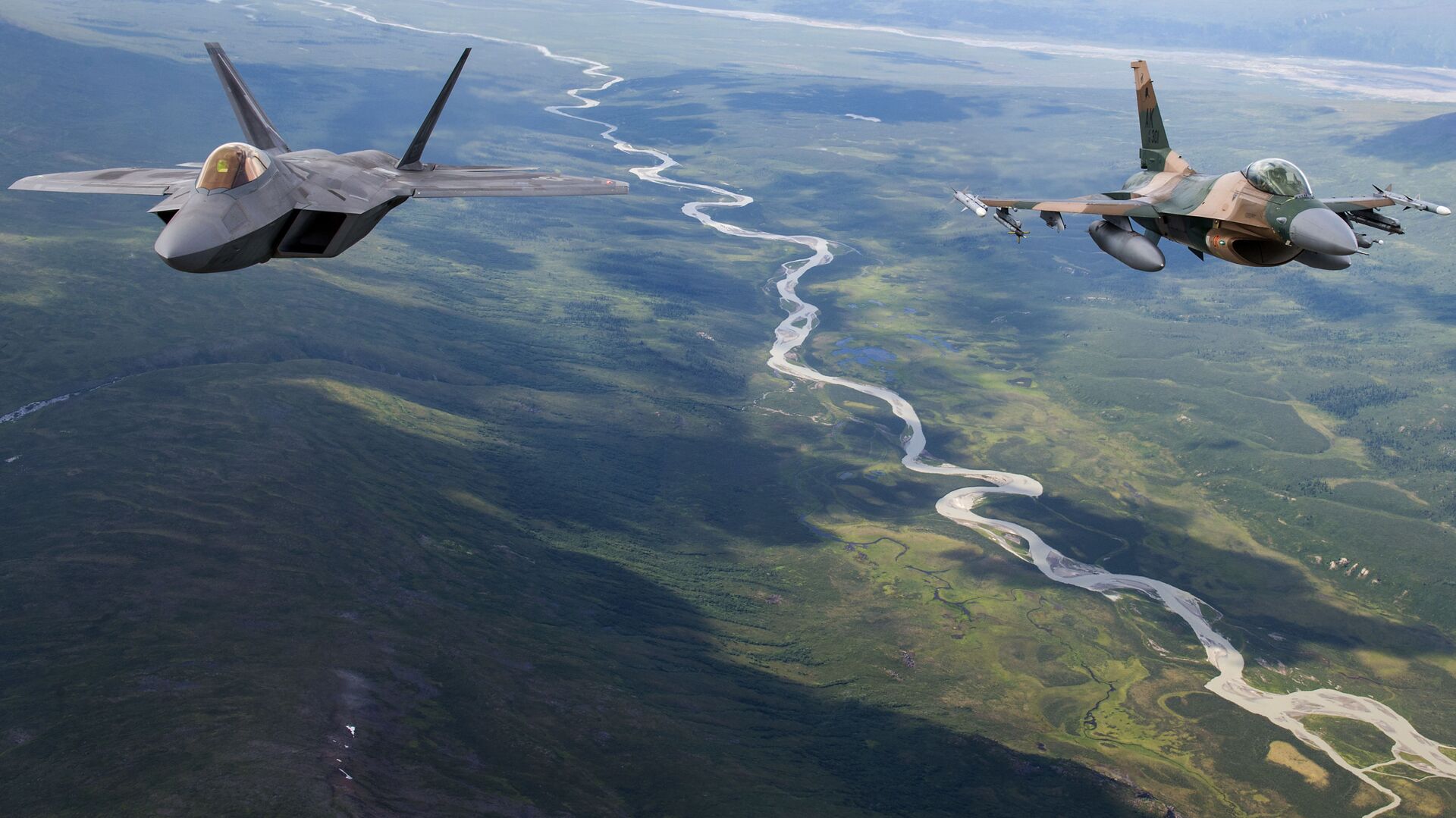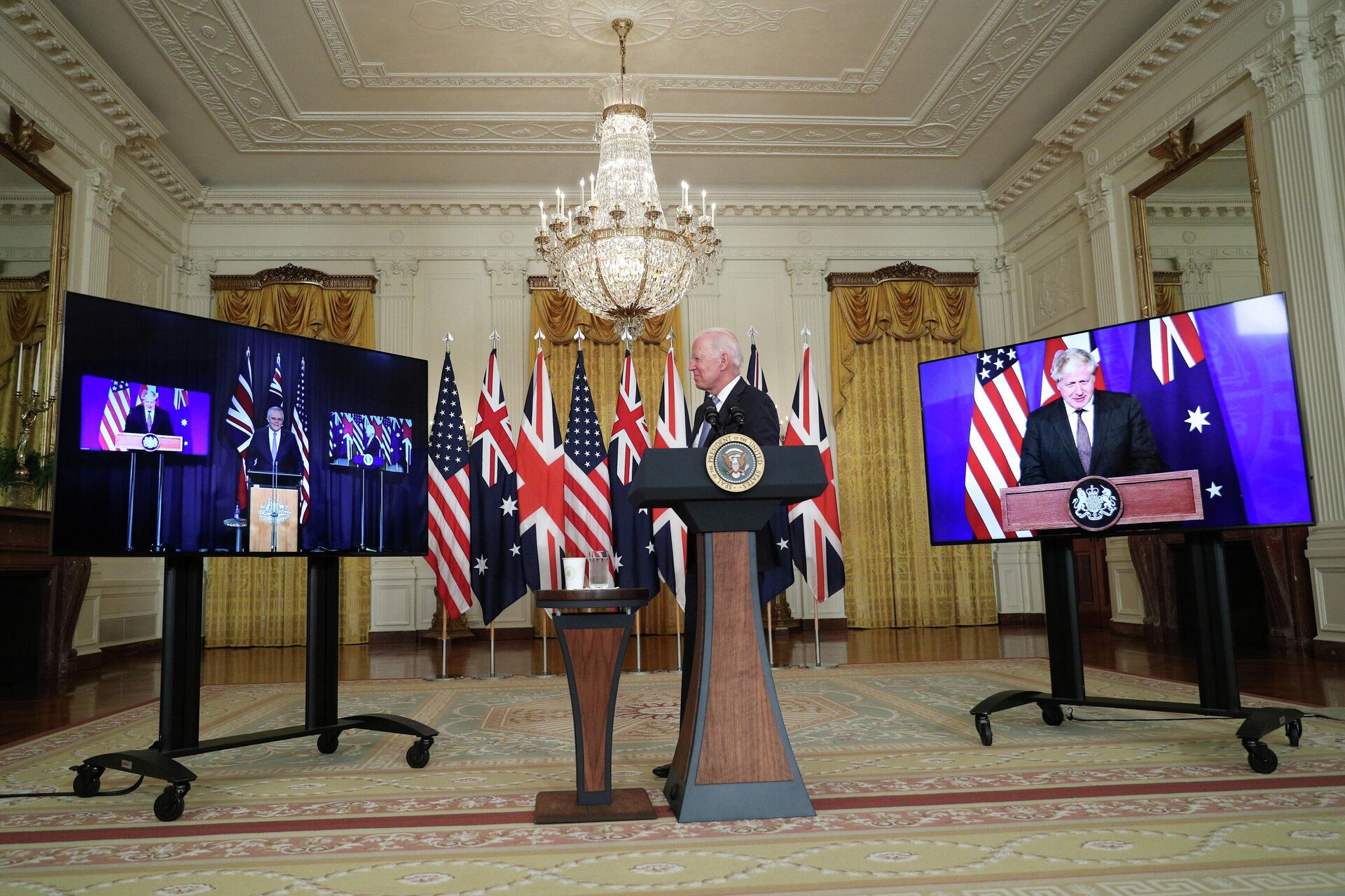https://sputnikglobe.com/20210917/us-will-boost-military-presence-in-australia-as-china-slams-irresponsible-aukus-pact-1089147118.html
US Will Boost Military Presence in Australia as China Slams 'Irresponsible' AUKUS Pact
US Will Boost Military Presence in Australia as China Slams 'Irresponsible' AUKUS Pact
Sputnik International
On Wednesday, US President Joe Biden, Australian Prime Minister Scott Morrison, and his UK counterpart Boris Johnson unveiled the AUKUS security alliance "to... 17.09.2021, Sputnik International
2021-09-17T05:47+0000
2021-09-17T05:47+0000
2023-05-28T15:24+0000
china
australia
scott morrison
news
warplanes
alliance
aukus
us
world
united kingdom (uk)
https://cdn1.img.sputnikglobe.com/img/107932/68/1079326834_0:121:3211:1927_1920x0_80_0_0_0e1e51efc399451a7181bb4c259652ae.jpg
Washington and Canberra have agreed on bolstering bilateral military collaboration that will include the "rotational deployment" of all types of American warplanes to Australia.The move comes a day after the two countries along with the UK announced the creation of the so-called AUKUS defence alliance, which, in particular, stipulates arming Australia with a nuclear-powered submarine fleet.The AUKUS pact prompted Australia to withdraw from a $90 billion submarine contract with France's Naval Group, in what French Foreign Minister Jean-Yves Le Drian described as "a stab in the back". Despite China not being mentioned in a statement about the pact's creation, the defence alliance is widely seen as an effort to contain Beijing's increasing assertiveness in the Indo-Pacific region.He said that aside from "greater air cooperation", the sides also "established combined logistics sustainment and capability for maintenance to support our enhanced activities, including logistics and sustainment capability for our submarines and surface combatants in Australia".Dutton was echoed by his US counterpart Lloyd Austin who said that Thursday's ministerial meeting had endorsed "major force-posture initiatives that will expand our access and presence in Australia".France Was Told About AUKUS 'Night Before'The gathering came as Australian Prime Minister Scott Morrison argued that Paris was briefed about Australia's new submarine deal "the night before" the AUKUS announcement.He denied allegations in the French media that President Emmanuel Macron had only found out about Canberra's withdrawal from the Naval Group deal from Australian news reports, stressing that France remains an important ally.According to the Australian prime minister, "what we were previously building was no longer going to meet that need".Beijing Criticises AUKUS Pact The remarks were made amid the Chinese Foreign Ministry's criticism of Australia's plan to strengthen defence cooperation with the US and the UK, which the ministry said raises questions about Canberra's adherence to nuclear non-proliferation.Spokesman Zhao Lijian urged the alliance's signatories to "abandon the obsolete Cold War zero sum mentality" or "they will only end up hurting their own interests". The spokesman slammed the AUKUS pact as "extremely irresponsible", something that he claimed would ride roughshod over regional stability.White House spokeswoman Jen Psaki, for her part, insisted the AUKUS pact was not aimed at China, adding that Washington does not "seek conflict with China".This came as European Commission spokesman Peter Stano told reporters on Thursday that the European Union (EU) was not informed about the new defence alliance between Australia, the US, and the UK, and that Brussels is currently in contact with its partners to obtain more details about the matter. "[…] We will, of course, have to discuss this within the EU with our member states to assess the implications", Stano said.
china
australia
world
united kingdom (uk)
Sputnik International
feedback@sputniknews.com
+74956456601
MIA „Rossiya Segodnya“
2021
Oleg Burunov
https://cdn1.img.sputnikglobe.com/img/07e4/09/0b/1080424846_0:0:2048:2048_100x100_80_0_0_3d7b461f8a98586fa3fe739930816aea.jpg
Oleg Burunov
https://cdn1.img.sputnikglobe.com/img/07e4/09/0b/1080424846_0:0:2048:2048_100x100_80_0_0_3d7b461f8a98586fa3fe739930816aea.jpg
News
en_EN
Sputnik International
feedback@sputniknews.com
+74956456601
MIA „Rossiya Segodnya“
Sputnik International
feedback@sputniknews.com
+74956456601
MIA „Rossiya Segodnya“
Oleg Burunov
https://cdn1.img.sputnikglobe.com/img/07e4/09/0b/1080424846_0:0:2048:2048_100x100_80_0_0_3d7b461f8a98586fa3fe739930816aea.jpg
china, australia, scott morrison, news, warplanes, alliance, us, world, united kingdom (uk)
china, australia, scott morrison, news, warplanes, alliance, us, world, united kingdom (uk)
US Will Boost Military Presence in Australia as China Slams 'Irresponsible' AUKUS Pact
05:47 GMT 17.09.2021 (Updated: 15:24 GMT 28.05.2023) On Wednesday, US President Joe Biden, Australian Prime Minister Scott Morrison, and his UK counterpart Boris Johnson unveiled the AUKUS security alliance "to protect and defend" the three countries' "shared interests in the Indo-Pacific".
Washington and Canberra have agreed on bolstering bilateral military collaboration that will include the "rotational deployment" of all types of American warplanes to Australia.
The move comes a day after the two countries along with the UK announced the creation of
the so-called AUKUS defence alliance, which, in particular, stipulates arming Australia with a nuclear-powered submarine fleet.
The AUKUS pact prompted Australia to withdraw from a $90 billion submarine contract with France's Naval Group, in what French Foreign Minister Jean-Yves Le Drian described as "a stab in the back". Despite China not being mentioned in a statement about the pact's creation, the defence alliance is widely seen as an effort to contain Beijing's increasing assertiveness in the Indo-Pacific region.
Speaking to reporters on Thursday, Australian Defence Minister Peter Dutton stressed that Canberra and Washington would be "significantly enhancing" bilateral "force posture cooperation, increasing interoperability, and deepening alliance activities in the Indo-Pacific".
He said that aside from "greater air cooperation", the sides also "established combined logistics sustainment and capability for maintenance to support our enhanced activities, including logistics and sustainment capability for our submarines and surface combatants in Australia".
Dutton was echoed by his US counterpart Lloyd Austin who said that Thursday's ministerial meeting had endorsed "major force-posture initiatives that will expand our access and presence in Australia".
France Was Told About AUKUS 'Night Before'
The gathering came as Australian Prime Minister Scott Morrison argued that Paris was briefed about Australia's new submarine deal "the night before" the AUKUS announcement.
He denied allegations in the French media that
President Emmanuel Macron had only found out about Canberra's withdrawal from the Naval Group deal from Australian news reports, stressing that France remains an important ally.
Defending the decision to scrap his country's hefty contract with Naval Group, Morrison said that "at the end of the day we have to keep Australia safe and make decisions that do the best things to keep Australia safe".
According to the Australian prime minister, "what we were previously building was no longer going to meet that need".
Beijing Criticises AUKUS Pact
The remarks were made amid the Chinese Foreign Ministry's criticism of Australia's plan to strengthen defence cooperation with the US and the UK, which the ministry said raises questions about Canberra's adherence to nuclear non-proliferation.
Spokesman Zhao Lijian urged the alliance's signatories to "abandon the obsolete Cold War zero sum mentality" or "they will only end up hurting their own interests". The spokesman slammed the AUKUS pact as "extremely irresponsible", something that he claimed would ride roughshod over regional stability.
The United States, Britain, and Australia were "severely damaging regional peace and stability, intensifying an arms race, and damaging international nuclear non-proliferation efforts", Zhao asserted.
White House spokeswoman Jen Psaki, for her part, insisted the AUKUS pact was not aimed at China, adding that Washington does not "seek conflict with China".
This came as European Commission spokesman Peter Stano told reporters on Thursday that the European Union (EU) was not informed about
the new defence alliance between Australia, the US, and the UK, and that Brussels is currently in contact with its partners to obtain more details about the matter. "[…] We will, of course, have to discuss this within the EU with our member states to assess the implications", Stano said.




